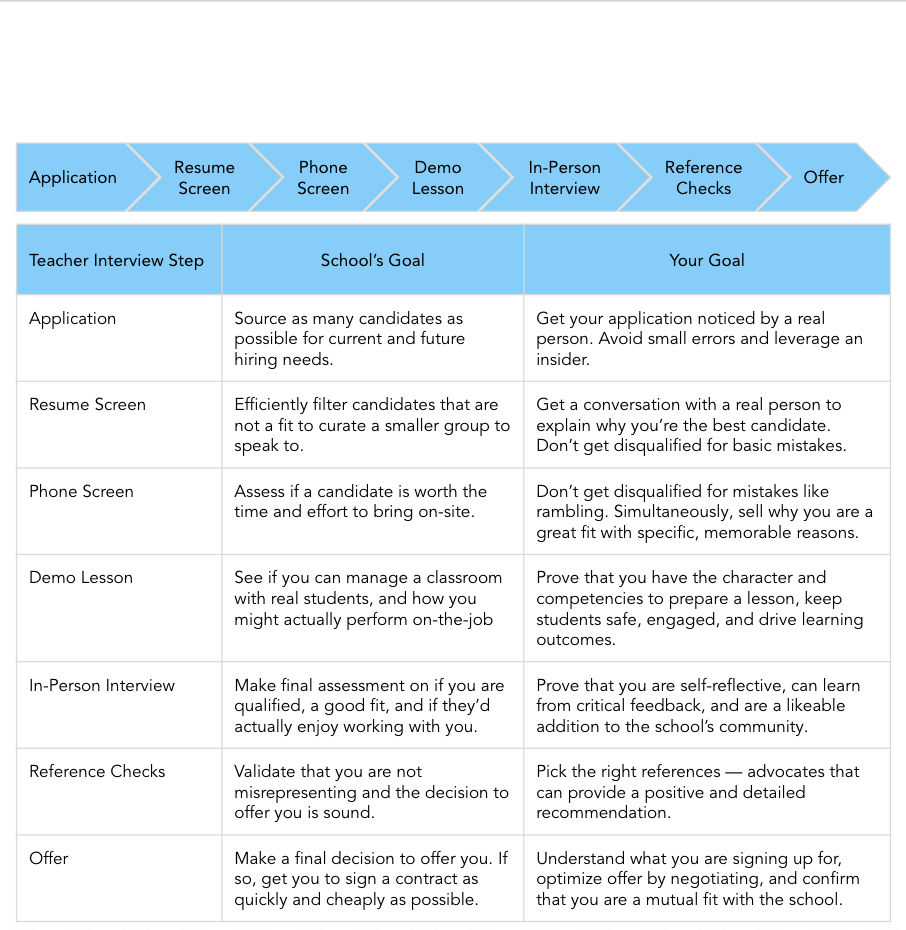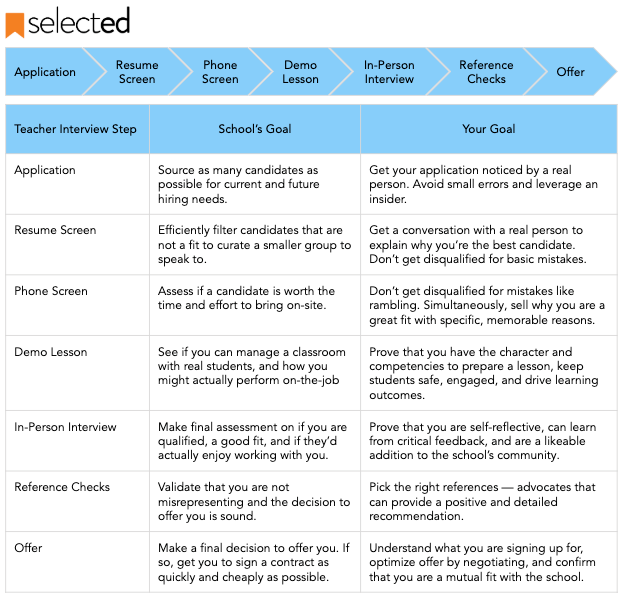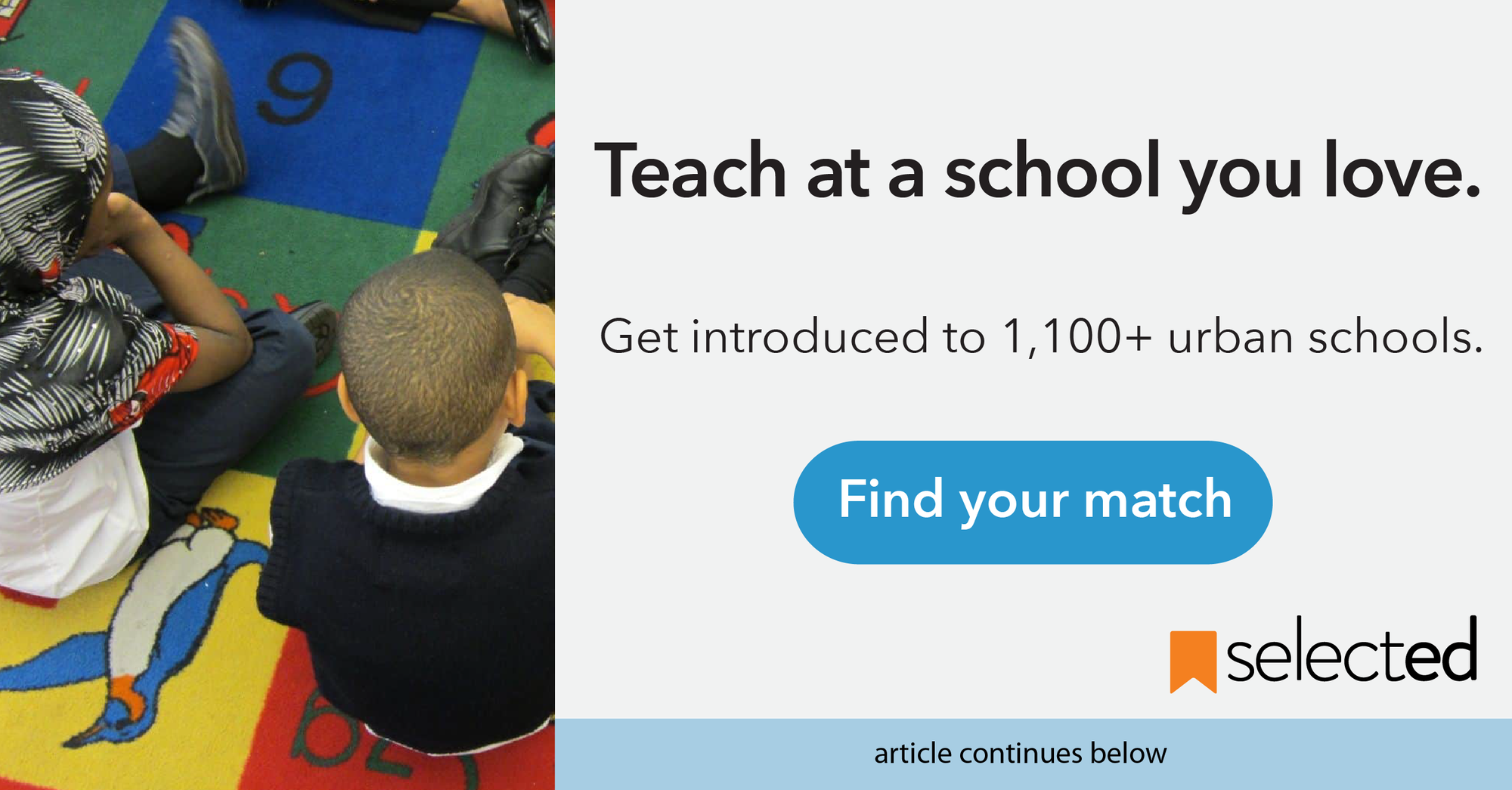Teacher Interview Process: What To Expect From Hiring Schools
This article describes the typical interview process for teachers seeking a new job at a Pre-K to 12 school: what to expect and how to successfully get a teaching job offer.

Each school’s recruitment and interview process is different — it is shaped by the school’s goals and circumstances, including the positions that need to be filled, time of year, and internal dynamics. This article will cover what happens behind the scenes, the most commons interview steps, and how to pass each step to get a teaching job offer. We try to describe the most typical interview process as a starting point for your preparation. Our insights are based on conversations with hundreds of recruitment teams hiring teachers on Selected, and thousands of candidates that we coach through the interview process.
Who is this for?
This article is for all teacher candidates looking for a new teaching job, including first-time teachers and experienced, mid-career switchers. The goal is to provide insights into the interview process based on constant conversations with a range of school recruitment teams — from individual community charters to large districts. This article is geared towards candidates seeking full-time, lead or co-teaching positions at a Pre-K to 12, public or private school. We will cover process nuances for different roles, experience levels, and school types in the future. The intended outcome is for you to understand how the process works so you can strategize, prepare, and excel during your interviews.
Behind the Scene: Who at the School is Involved?
A school isn’t a monolith, or a building, it’s an organization of people with competing thoughts, motivations, and interpersonal dynamics. When you interview, there are a variety of roles and personalities involved in making the decision to hire you, including:
- Recruiters and HR Team Members: Their function is to find the right candidates, convince them to apply, screen out candidates that are not a fit, bring people on site, and hand off to other interviewers. A top goal for this group is to efficiently “source” as many, high-quality candidates for on-site interviews, while filtering out wrong-fit candidates.
- Hiring Managers: A principal, assistant principal, head of school, dean of faculty, or other senior school leader is the decision maker and has the power to offer you a job, or not. A key motivation is sustainable team building — not only filling open positions but building a collaborative team of people who will stay and grow for years to come. Teacher turnover is a top concern due to the high effort and cost or re-hiring and, ultimately, because it is disruptive to students.
- Other Interviewers: Content and grade leads, head of upper and lower schools, or other experienced teachers and leaders have significant influence over hiring decisions.
- Executives and Senior Administrators: If you are interviewing at a larger school district or charter school network, there may be an additional tier of senior leaders (e.g., superintendent or CEO) who may be directly or indirectly involved in hiring decisions.
Regardless of title, participants in the interview process will adopt various roles that you will need to manage to proceed to subsequent rounds:
- Insider: Having a friend or acquaintance at the school is a huge advantage (if you don’t have one, Selected can be your Insider). Any positive relationship with a current teacher or administrator can dramatically boost your chances of getting a job. This person provides social proof that you are a fit for the role and school, and can take the critical role of your Champion. Improve your odds by leveraging your network. If you don’t know anyone at the school, start developing relationships today, and leverage Selected, before interviewing.
- Screeners: It is critical to avoid making mistakes and giving recruiters or others a reason to exclude you before you begin. Even if you are qualified for a position, potential character or “soft skill” issues, such as being rude, missing scheduled calls, or having a bad resume can result in elimination (the decision can happen in seconds). Later in the process, Screeners can become Influencers by providing important data, particularly from the early phases.
- Influencers: Experienced teachers and front-line leaders (e.g., content or grade leads) exert significant influence on whether you will get offered or not. For example, during the demo lesson, these interviewers are assessing you on a range of criteria, so it is important to convince each and every Influencer that you are a great addition to the team.
- Champion: It’s important to secure at least one person to become your strongest advocate. The more champions you have, the better your chances are. The inverse situation is having a group of interviewers who are lukewarm to you — resulting in the school hiring a different candidate (your unknown competitor). Have you ever experienced the situation where things were going really well and then suddenly the school goes radio silent? What might have happened is that the team didn’t feel strongly about you and is now pursuing someone else.
- Saboteur: Anyone involved may also become your strongest detractor. For whatever reason — they don’t think you have the right stuff, you said something that turned them off, or they are biased against you in some way — this person can sink your chances in an instant. Candidates frequently underestimate the power of just one negative voice in the process. That’s why we advise candidates to be engaged and pleasant with everyone, including people that aren’t officially interviewing you (e.g., the person who greeted you when you first checked in). You should attempt to win over every person you encounter (e.g., office admins, students in the hall, other staff), as it is a strong signal to your interviewers on how you will behave on-the-job. The best recruitment teams will proactively solicit feedback from everyone who interacted with you. If they have enough candidates to choose from (the best schools will), they won’t have to take any chances with a candidate even one person has doubts about.
- Decision maker: Ultimately, this is the person (e.g., Hiring Manager) who you need to win over, particularly during the final, one-on-one meeting. Typically, this person won’t get involved until later rounds (to save time), and will be the final evaluator of your fit. This person will also be the primary person trying to sell you on the opportunity and school (e.g., school culture, community, professional development opportunities).
How is the decision to hire you made?
It depends on the school — no two school interview processes are exactly the same. The decision to offer you a job (and how you are evaluated) varies from casual to rigorous and individual to group-based. A process is the result of the school’s planning and execution of its hiring goals. Below are key factors that implicitly shape your interview experience:
A good place to start is constraints, because a school doesn’t have a choice on:
- Type of school: Needs of an individual community charter school are very different than those of a large district or charter management organization (CMO). Factors to understand include the community and students served (e.g., high-need, multi-lingual, first-generation college), as well as, legal and financial structure (e.g., private vs. public, district vs. charter, secular vs. religious).
- Pedigree: The mission, values, cultural traditions, pedagogical beliefs, and past and present leaders are inextricable from the school’s identity, and may be difficult or impossible to change. A school’s “cultural DNA” will directly influence the line of questioning you get. For example, a progressive school might ask questions about exploratory, project-based learning while a low-performing school might ask about responding to data on student outcomes for standardized testing. Understanding the context is a shortcut to preparing the right approach.
- Type of role: The role is the role. Regardless of how great you are, a school desperately seeking a high school physics teachers will not give you the time of day if you are an elementary art teacher. Focus on schools that need what you offer — deeply understand what the school needs and its requirements, such as certification needs, minimum years experience, and extracurricular participation.
- Budget: If a school doesn’t have the money, this will automatically shut out teachers that have higher salary expectations (e.g., more experienced teachers).
- Timing: Many candidates we speak to underestimate how much timing plays in the process. A school’s decision will be pressured by when it has to hire — immediately vs. for the next school year. Unexpected mid-year departure and early vs. late in the hiring season are factors. Public and private schools have different hiring seasons.
- Organizational habits: Schools have good and bad habits, biases, and preferences for specific candidate types. For example, some schools focus on hiring more inexperienced teachers to train them on their system (versus having to “re-program” seasoned teachers with entrenched opinions and habits). This factor is particularly difficult and unpredictable to candidates, particularly if a school does not systematically check its biases based on age, race and ethnicity, gender, superficial personality traits, among many other qualities. Your best bet is to learn about a school’s idiosyncrasies from an Insider (or online research), or observe them early in the process and adapt your approach.
- Macro trends: There are other, larger factors that are difficult to see but are major drivers of your experience and career trajectory, including your locale’s political and economic situation, changes to education and administrative policies, legal mandates, approach to standardized testing, curriculum changes, student population growth, and supply of available teachers (e.g., shortage of STEM, special education, or multilingual teachers). The more you understand the big picture, the better you will be at strategizing your interview approach (and long-term career plan). Did you minor in math? Did you speak a second language growing up? The trend is your friend — highlighting and positioning yourself carefully can make a big difference.
Beyond the circumstances described above, a school’s hiring goals ultimately dictate how a decision gets made. A recruitment team is trying to find candidates that meet the school’s needs by assessing leading indicators of on-the-job success. The types of people schools look for vary widely, but here are common assessment dimensions we see time and again:
- Character: These are the indispensable characteristics a teacher needs to be successful in the classroom (and greater school community). Examples: self-reflective, growth mindset, coachable, adaptable, experimental, gritty, problem solving, dependable, and goes the extra mile.
- Culture: Are you a great (not just good) fit with the school’s mission, values, pedagogy, and interpersonal dynamics? Do you raise or lower the bar?
- Competencies: Do you have the hard and soft skills and experiences to be a successful teacher at the school? Examples: Classroom management skills, content expertise, communication effectiveness, organization, and data-driven decision making.
Common Interview Process Steps
Here is the most typical teacher interview process that we see:

Application
Before modern tools like Selected, a candidate would have to apply to hundreds of job postings (through a job board or school website) and wait to see if they hear anything back. On the school’s end, your application, along with everyone else’s, is fed into a single repository. Many schools use a software tool called an Applicant Tracking System (“ATS”) that lets them post and manage open jobs and have all the applications feed back to the system. Even if a school is not actively hiring for a role, they may keep a job post up so they can collect resumes as leads in case they need them in the future. Good for them, not for you.
- School’s goal: Source as many leads as possible for current and future hiring
- What to expect: In the background, HR or marketing team members (e.g., recruiters) are creating job postings and sharing them on their website, job boards and sites, email lists, and other channels to get a job-seeking teacher to apply.
- Your goal: Get your application noticed by a human. Ever apply into a blackhole and never hear back from anyone? This may be because your resume is collected and stored with hundreds or thousands of others and difficult to notice. This is where an Insider can be a huge help — shortcutting the line and guaranteeing eyes on your application.
- What to avoid: Not following instructions, silly errors such as typos or leaving items blank, not following up, not trying to get in touch with a human.
- Selected Resources: How can I learn more about a particular school?
Resume Screen
Your resume and application are quickly reviewed to assess your candidacy. Often, a recruiter will review every resume, but only spend a few seconds to a few minutes, max (e.g., 30 to 60 seconds).
- School’s goal: Efficiently review as many resumes as possible to find the best candidates to speak to while eliminating those who are not a fit.
- What to expect: Assessment by a recruiter (larger school or network) or someone with this responsibility (e.g., principal, head of school, experienced teacher, someone from Human Resources, operations, or administration at a smaller school or network). The recruiter has yes/no/maybe criteria used to decide whether to pass you through or not (sometimes in a formal, documented checklist, but often an implicit list in their head). Often, for the sake of efficiency, they look to rapidly disqualify candidates (e.g., using technicalities such as certification, years of experience, minimum GPA) while looking for stand-out candidates (e.g., role-fit for grade and subject, quality of experience, extracurriculars) to curate a smaller pool of likely best-fit candidates.
- Your goal: Get a conversation with a real person so you can explain what you bring to the table.
- What to avoid: Simply, don’t get disqualified. Much of this step is defense — avoid common mistakes on your resume, then work to stand out from the crowd.
- Selected Resources: Get a free, professional resume review within 24 hours. Top 5 Resume Tips. Revamp Your Resume (full-length workshop video).
Phone Screen
For instructional roles, you’ll have a 15- to 30-minute call with an interviewer — a call is a low-cost, low-commitment way to gain much richer insight into your communication style, thought process, and personality.
- School’s goal: Assess if a candidate is worth the time and effort to bring on-site and putting in front of a larger group of interviewers.
- What to expect: A recruiter (or experienced teacher, administrator) is assessing you live to tease out any red flags to eliminate you, or find evidence that you are actually a good fit.
- Your Goal: Get past this final screening round and in front of real people so you can show how great you are. Don’t give the interviewer any reason to doubt and eliminate you. Simultaneously, you have to shine by actively selling why you are a good fit with several compelling, easy-to-remember reasons.
- What to avoid: Rambling. We cannot emphasize strongly enough the importance of being concise and direct. Think before you respond and actually answer the question. Many candidates are eliminated at this step because they are nervous and fill silence with words. An interviewer has several, specific questions they need to get through — answer the question and move on after a minute or two. You can always ask if you should elaborate, but empower the interviewer with the option. Look for cues that encourage you to speak less or more (e.g., interviewer has to cut you off, or asks you to expand), ask for feedback, and clarify the question if you don’t understand. Separately, avoid silly mistakes that signal character issues, such as being late to the call, canceling last minute with excuses,, rescheduling multiple times, a noisy background during the call, or poor phone service.
- Selected Resources: Three Things to Know About a Phone Interview with a School Recruiter. What a Former Teacher Recruiter Wants You to Know.
Demo Lesson (aka Sample Lesson)
Congrats on reaching this step, the vast majority of candidates won’t make it this far! Now, the hard part — the technical round.
- School’s goal: Assess if they can put you in the classroom with students, and how you might actually perform on-the-job.
- What to expect: A group of one to five interviewers (depending on the size of the school’s team and time of year) will ask you to teach real students in a classroom for 15 to 45 minutes. The duration of the demo depends on the role and your experience level, and varies from school-to-school. Associate positions and first-time teachers see the lower end of the range. It’s rare to not have students present (e.g., faculty members pretending to be students), even during summer! During busy times, there might be only one observer, other times you might see a full panel including a Hiring Manager, Other Influencers, Recruiters and HR Members, and sometimes, even Executives and Senior Administrators. An example group is the principal, an assistant principal, head of English Language Arts, an experienced teacher, and the recruiter who screened you. During this time, there is little to no interference from the group — you are on your own.
- Your goal: Prove that you have the character and competencies to manage a classroom and drive learning outcomes. This is your time to shine. You will need to check a lot of boxes for each of the interviewers across a range of criteria (sometimes formally documented as a Hiring Scorecard, but often implicitly in their minds). Example criteria are evidence of organization and thoughtfulness, a strong lesson plan, ability to keep students safe, authority, behavior management, engagement techniques, communication effectiveness, and, oh ya, your actual instruction skills and content expertise.
- What to avoid: Losing control of your emotions or the classroom, anger, yelling, allowing unsafe behavior, not having procedures, not setting expectations, and countless other things that can go wrong in the classroom.
- Selected Resources: Ace the Teacher Demo Lesson. Acing the Demo Lesson (full-length workshop video). Use Non-Verbal Communication to Improve Classroom Engagement. Improve Student Behavior Without Shame or Punishment. Determine Effective Consequences. How to Have Difficult Conversations with Students About Their Behavior.
In-Person Interview
In rare cases, if the candidate is clearly not a good fit or not qualified, the Demo Lesson can be cut short and there will be no more interviews. But more often, regardless of how the Lesson went, you will be given the opportunity to debrief with a smaller group, often one-on-one with the Hiring Manager.
- School’s goal: Make a final assessment on if they believe they can work with all the strengths and development areas that you bring to the table, if they would actually enjoy working with you, and if you would fit in with the school’s culture and community.
- What to expect: A Hiring Manager will ask you to reflect on how the lesson preparation and execution went. The school leaders can ask high-level questions (e.g., your perceived development areas) to low-level questions (e.g., tactics of preparing supplemental materials). You can also expect them to provide feedback and ask you how you might re-implement certain aspects of the lesson. Many questions will address perceived risk areas, including any concerns the Hiring Manager or any other Influencer has.
- Your goal: It is critical for you to use this opportunity to be self-reflective and demonstrate a growth mindset. Can you prove that you are constantly self-improving, coachable, data-driven, and won’t give up trying to be a better teacher everyday? The interviewers might provide critical feedback, which is never easy to hear. What they are trying to do is to see how you respond to feedback. You’re not a perfect teacher, no one is. The question is how you choose to proceed. Finally, you want to be genuine, likable, and show that you will bring great things to the school.
- What to avoid: Flat answers with no self-awareness, humility, or acknowledgment of improvement opportunities. Unfocused rambling and not answering the question. Negative or emotional responses to feedback (e.g., defensiveness, anger, attitude, not taking personal responsibility). Being dull and not showing off your personality and passions. It’s not just about answering all the questions “correctly ” — you need to proactively convince them that you are a person they would love working with.
- Selected Resources: Top 5 Tips to Ace the In-Person Teacher Interview. Acing the Teacher Interview. Top Teacher Interview Questions. Teacher Interviewing 101 (full-length workshop video). Ace the Teacher Interview : What to Expect & How to Succeed (full-length workshop video).
Reference Checks
If you made it this far, you are well on your way to getting a job offer. Some schools will ask for references up-front to save time and use it to assess you. But for many schools, this final due diligence is a sanity test that you are the real deal (and not a fantastic liar).
- School’s goal: Validate that you are not misrepresenting yourself and that they are making the right decision to offer you.
- What to expect: Most schools will ask for around three references — they want to speak with your current supervisor, a previous supervisor, and a colleague or former colleague. If you are a recent grad or First-Time Job Seeker, you should be able to provide at least one professor who can vouch for you.
- Your goal: Pick the right references! This may seem like a no-brainer, but it is critical to line up advocates (external Champions) who will speak effusively (not tepidly) about you. This is one of the few steps in the interview process that is completely in your control.
- What to avoid: Casually picking people who don’t really know you, or who may offer generic recommendations, red flags, or create doubt. Last minute issues can derail your offer, especially when there are other strong candidates. It’s almost always better to get a strong and specific recommendation from a lower-level leader, such as a grade level chair or department head, versus a generic one from a principal. Also, line up references early! Give them a heads up with plenty of time to prepare. You might recall all the details or your experience, but a principal or professor interacts with hundreds or thousands of teachers over the years. A common mistake is when a recruiter reaches out to a reference and they are caught off-guard — that usually doesn’t end well for the candidate.
Offer
This step may happen in parallel with Reference Checks. This is arguably the most important step in the process. Be deliberate and decide carefully.
- School’s goal: Make a final decision whether to give you a job offer or not. If yes, then “close” you (get you to sign an employment contract) as quickly and cheaply as possible.
- What to expect: A Hiring Manager will sell you on how great the opportunity is — wonderful students, supportive leaders, growth and professional development opportunities, a compelling career path, school culture and values, even facilities and perks. A school may even create pressure to get you to sign with a deadline to accept and communicating that there are other candidates who were offered.
- Your goal: Fully understand what the deal is. Ask all the questions you need (you are interviewing the school) and negotiate to optimize the offer. Selected helps thousands of teacher get amazing jobs at schools they love — we have learned that the single most important factor we see for teacher job satisfaction and long-term growth is picking a school where both the teacher and school align on culture, values, pedagogy, and other important criteria. So do yourself a favor — alleviate pressure by getting several, compelling options. Ask yourself if this school is right for you. Also, are you the right teacher for this school? It’s about mutual fit.
- What to avoid: Not asking any questions. Not actively interviewing the school while they interview you. Asking perfunctory, non-consequential questions instead of the real questions, such as teacher turnover. Not assessing the quality of leadership. Not asking school staff and outsiders about the actual school’s culture and values. Taking the offer as-is without negotiating. Only getting one offer from one school and being forced to take it. Not focusing on mutual fit.
- Selected Resources: Is this School Right for Me? Finding Your Ideal School Fit (full-length workshop video). Negotiating Your Next Teaching Job Offer. Stories from Teachers Who Have Negotiated for More. How to Write a Great Email to a Hiring Manager.
Your Experience May Vary
The interview process that you actually experience may vary wildly from school-to-school, including based on the type of school, role, and even time of year. Interviewers are humans so the process they describe versus their actual practice may not reconcile, particularly because of:
- Style and experience level of a recruitment team: Our candidates report a wide range of interview experiences — from delightful to tense and structured to less-than-organized. Every school is different so it’s important to adapt your strategies and approach each process differently.
- Supply and demand: It’s hard to see but your experience will also depend on how many quality teachers applied for the job you want. You can do a great job interviewing but may still not get a job if the supply of teachers is high and the competition is fierce. For example, currently on Selected, we see more elementary general education teachers than there are available jobs, and less high school math teachers relative to open roles. If you are currently at a graduate school of education, future school demand is something for you to consider. Even for experienced educators, it’s never too late to grow into different areas and develop marketable skills.
Finally, if a school says “no,” hiring needs can and do change. We work with hundreds of actively hiring schools and observe this all the time. We even see some schools drastically change (ahem, decrease) their standards late in the hiring season or for immediate hires. It may be worth reaching back out to schools that you really like at different points in the year to see if they are more receptive to hiring you. We can help, check out our free teacher-school matching platform.
What has your experience been? Request for an article? Reach us at hello@getselected.com.
About Selected
Selected helps teachers find jobs at schools they love. We offer a free school matching and career support platform for teachers that connects them with 1,200+ PK-12 public and independent schools in urban metro areas in the Northeast and West Coast, including New York City, NJ, CT, Philadelphia, Washington DC, Boston, and Los Angeles. Make a FREE profile and start speaking with hiring schools immediately!





